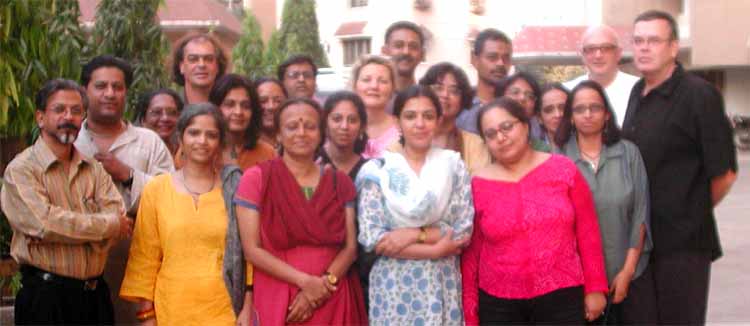|
|||||||||||
|
|||||||||||
|
|||||||||||
|
The two-day December workshop in Mumbai brought up great new ideas and a civilizational gap
The general Q and A session was a little more exciting since everybody had some strong point to bring up about the approach, the methodology, the themes, the truly international spirit of a series as the Democracy project envisages. One film-maker was especially concerned about this unnerving, scary experience for an independent not belonging anywhere and being pushed to fit into a package. Money power is scary for the indie, he said, and was worried about getting into such power zones. Film-makers were also concerned about the concept of international collaboration. How much would it interfere with the process of making the film? What amount of creative freedom is ensured and how? This was rather critical, since many of the film-makers present at the meet make strong activist films. Nick Fraser made a point of elaborating on faith and building relationships in such projects. Iikka spoke of maximum freedom in ‘your’ space where you know your limitations (my emphasis). I think the point was completely lost. The Democrats unconsciously learnt a big lesson during this discussion. The strong support base for Muslims among the intelligentsia of India made sure that the Democrats will be wary in specifically naming Islam in a negative context in any of their documents. The West / North / Occident is too civilized and cultured to openly state anything against Islam. But post-September 11, the undercurrents in Europe and the Americas --- even among intellectuals --- clearly indicate that Islam has become synonymous with terrorism. Even more, that now, the ‘Christian’ world considers the ‘Islamic world’ a threat to humanity. No Indian, especially the ‘leftish’ kind, will swallow that without shrieking to the ends of the earth. When film-makers had a chance to ‘briefly’ show their films, obviously, STEPS was expecting exciting stuff. BUT…oh my, this is surely a ‘but’ article!!…the ‘technical’ exposure must have been rather disappointing for the visitors. A film-maker can always justify the ‘working conditions’ why picture, sound or narrative quality are weak. But no viewer ever comes back to ask why. It was a pity that the Indian film-makers failed in giving STEPS a glimpse of the possible potential of doing a technically high quality narrative on Democracy in --- rather from --- India. Day two was the big day. The film-makers were split into two groups to discuss the possible ‘universal’ film ideas from India for the Democracy series. This is when it became clear that the Democracy document had not been perused carefully by the film-makers. Some points in the document are really quite clear, at least as clear as is possible when designing a wide-ranging international project. They are also repeatedly stated in different ways, probably in the hope of giving a specific aura for the kind of films they are looking for. For instance the collection of films about Democracy
Unfortunately, since there were two groups, I could sit in on only one. There was a pathetic lack of formalized, constructed ideas matching the above stated points. Worse, little thought had been given to the possible visual segments, the strain of thought and opinion and the protagonists through whom a 52-minute story of international appeal would unfold. That was rather pitiful, since it became an almost wasteful (and expensive) exercise. With a couple of exceptions, film-makers were speaking in circles about rehashed political positions and the Democrats were waiting for the international hook with universality and unpredictability. Surprisingly, corruption, eating at Indian democracy, did not come up in the discussion. As an Indian film-maker, I was really sad to see that those present were still hanging onto the Gujarat kind of minorities scenario. In some cases, even good ideas were somehow being dragged into the fundamentalism scaffolding. Politics does fan communalism in India and it is a pathetic, unforgivable reality. But --- again, that but! --- there is a fascinating flip side to Islam in India. Long before the British Raj brought the tradition of divide-and-rule to India, long before the Constitution of secular free India created considerations for the minorities, Muslims and Hindus had built social bonds that in fact speak of the true diversity of India. Society, you could say even Hinduism, made 'space' for Islam and Muslims in quite contrary a manner say, to Turkey, for instance. Certainly with more open-mindedness, that too centuries ago, than how modern France reacts to scarves on a girl's head today. In north India, which was most exposed to Islamic invasions, 'Hindu' culture is full of 'Islamic' amalgamation in cuisine, language, music traditions, dress, colloquial symbolism, etc. In a post-September 11 world, the flip side of the story of Islam in India would make a great story that may change the way people equate any Muslim with Bin Laden today. Maybe, if the Commissioning Editors had a greater sense of the pulse of India, they could have steered potential Indian film-makers towards some dynamic ideas on the theme of Islam. Equally, I guess, the CEs felt they had come a long way in the hope that film-makers would offer them some vibrant, unusual themes. At the end of it all, it was just a great opportunity for some film-makers to meet some powerful movers in the world of international television; and an eye-opener for the CEs that they need some ‘innovative’ strategies to get ‘unpredictable’ films from the largest democracy in the world. |
